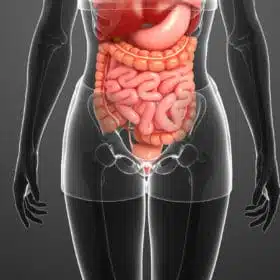Even though diets almost exclusively discuss carbohydrates, fats, training plans and fat burners, these aspects play a much smaller role than we all assume, because ultimately the hormonal milieu within our body decides whether we gain or lose weight. One of the most important components of the human organism in this context is the butterfly-shaped thyroid gland, which is located below the larynx and is one of the most important hormone production sites of our organism. In addition to the storage of iodine, its main tasks include the synthesis of the thyroid hormones thyroxine and triiodothyronine, which have a significant influence on both the function of the gastrointestinal tract and energy metabolism. Since the produced thyroid hormones directly affect fat and sugar metabolism, a disturbed thyroid function directly affects our body composition. In this article we will enlighten you about what a Hypothyroidism is, by which symptoms you can recognize them and how you can still lose weight in a targeted manner.
What is hypothyroidism?
Hypothyroidism refers to a disorder of hormone production in which the thyroid gland produces insufficient amounts of thyroid hormones, so that it can sometimes lead to significant disturbances in the entire organism. Hypothyroidism is congenital only in rare cases, which means that the cause of the malfunction is usually not genetic. Furthermore, hypothyroidism occurs preferably in the aftermath of persistent thyroiditis, in the course of which intact thyroid tissue is destroyed by the inflammation. Even though the classic chronic thyroiditis usually only affects women from the age of 40 to 50, this does not mean that creeping hypothyroidism cannot also surprise younger people in the course of their lives. For example, a special form of thyroiditis occurs in five to ten percent of all women immediately after childbirth, which may not heal completely and cause problems in the long term. Another reason that favors the occurrence of hypothyroidism is an iodine deficiency as a result of a diet low in iodine, which is particularly the case for people who do not consume sea fish and who also deliberately avoid table salt with added iodine.
How can I recognize hypothyroidism?
Unfortunately, due to its insidious nature, hypothyroidism is not immediately obvious, since especially at the beginning there are no symptoms at all or only weak symptoms, but their severity does not necessarily indicate a malfunction of the thyroid gland. Since the underactivity of the organ causes a considerable change in the hormonal milieu, symptoms appear in numerous parts of the body. The main characteristic is an increased sensitivity to cold, which is due to the reduced body temperature as a result of a hormonally induced lowered energy metabolism. In addition, affected individuals often complain of fatigue, which is accompanied by a lack of drive in everyday life and a significantly increased need for sleep. Since the human organism switches to energy-saving mode due to the lack of essential thyroid hormones, a slowed heartbeat can also be observed in the context of hypothyroidism, which in some cases is far below the expected resting rate. In addition, chronic constipation, fluid accumulation in the eyelids, and unexplained weight gain combined with elevated blood lipid levels are helpful indicators for identifying hypothyroidism. Clearly, all of the above symptoms provide only circumstantial evidence that should be confirmed by a physician's diagnosis via blood work.
What can I do about it?
Since hypothyroidism mainly affects hormone levels, you cannot do anything else to compensate for the undersupply of thyroid hormones without medical support. Medical therapy, which is incidentally lifelong, involves balancing hormone levels with tablets that contain synthetically produced thyroxine and should not be taken together with other medications. If, however, an obvious iodine deficiency is the cause of the organ's malfunction, you have a few options for getting it back under control. To supply your body with a sufficient amount of iodine, you should make sure that you consume sea fish about twice a week or pay attention to the use of iodine-containing table salt. Pregnant and breastfeeding women in particular, who have an increased iodine requirement due to special circumstances, should clarify in consultation with a medical professional whether the additional intake of Job through food or tablets is necessary to avoid the risk of creeping hypofunction.
Do I need to watch my diet?
Although taking the hormone preparations enables a largely normal life without major restrictions, this does not mean that those affected have to pay attention to nothing else. Since the absorption of the drug is blocked by calcium, the preparation must not be taken in combination with calcium-containing foods such as dairy products or fruit juices. Far from the intake, however, the consumption of such foods is completely unproblematic. The same applies to coffee, which must also not be consumed in the immediate vicinity of taking the drug.
Can I lose weight despite hypothyroidism?
Due to the fact that hypothyroidism results in a considerable slowing down of most metabolic processes, it is hardly possible to reduce body fat in the course of undiagnosed hypothyroidism, since even the intake of small amounts of food leads to weight gain or stagnation. However, once hypothyroidism has been diagnosed by a medical professional, the metabolism is accelerated to normal levels by taking a specific supplement, so that sustainable and healthy weight loss is readily achieved. The key to success in this case is also hidden in the conscientiousness of the dietary planning as well as in the consistency of the implementation of appropriate training. Since the hormonal milieu of the body is at a level corresponding to the norm due to the intake of appropriate medication, the principle of a slight caloric deficit for weight reduction also applies here.
Conclusion
The key to success here is also hidden both in the conscientiousness of diet planning and in the consistency of the implementation of appropriate training. Since the hormonal milieu of the body is at a level corresponding to the norm due to the intake of appropriate medication, the principle of a slight caloric deficit for weight reduction also applies here.






